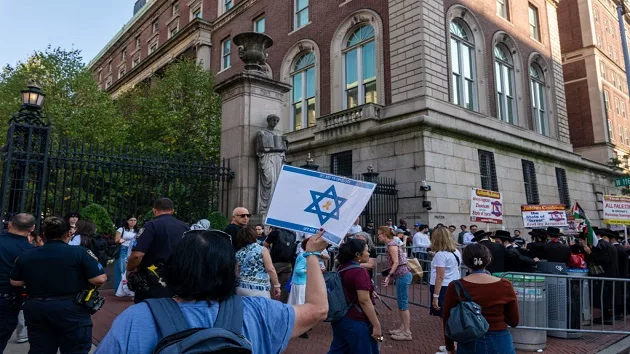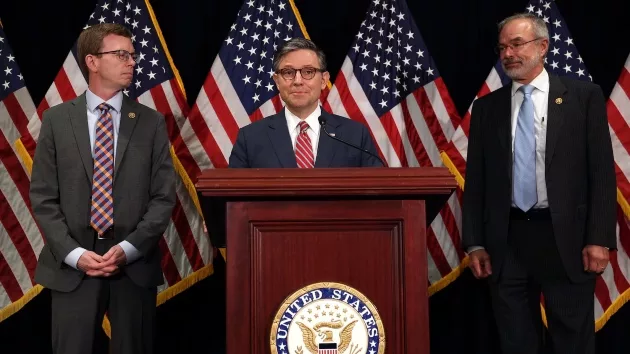(NEW YORK) — In a new report released as students return to campus, a Columbia University antisemitism task force has found the school failed to stop hate on campus and has not treated Jewish student concerns “with the standards of civility, respect, and fairness it promises,” calling the problem “serious” and “pervasive.”
Additionally, the task force of faculty members at the New York City school recommends a new definition of anti-Jewish hate, concluding, in part, that “celebrating violence against Jews or Israelis and discriminating against them based on their ties to Israel” constitutes antisemitism.
It comes as House Republicans in Washington have requested Columbia and other colleges and universities provide detailed plans on how they will deal with pro-Palestinian demonstrations that the GOP lawmakers say caused “antisemitic chaos” and disrupted the previous academic year.
Unrest broke out this past spring at Columbia and schools across the country, with students setting up encampments and clashing with police, disrupting classes and graduations as they protested against Israel’s invasion of Gaza after the Hamas terror attack on Israel on Oct. 7.
The Columbia task force said it heard testimonials from hundreds of Jewish and other students.
“These student stories are heartbreaking, and make clear that the University has an obligation to act,” its report said.
The task force said many Jewish and Israeli students “were on the receiving end of ethnic slurs, stereotypes about supposedly dangerous Israeli veterans, antisemitic tropes about Jewish wealth and hidden power, threats and physical assaults, exclusion of Zionists from student groups, and inconsistent standards. We propose this definition for use in training and education, not for discipline or as a means for limiting free speech or academic freedom.”
The report continued, “Specifically, we recommend anti-bias and inclusion trainings for students, resident advisers, resident assistants, teaching assistants, student-facing staff, and faculty. In a community dedicated to freedom of speech and pluralism, we must prepare students with different views and backgrounds to engage with each other. We must encourage mutual respect, tolerance, civility, and an open learning environment.”
In an Aug. 23 memo to students obtained by ABC News, interim President Katrina Armstrong said the school recently established an Office of Institutional Equity to redouble its commitment to addressing discrimination and harassment on campus, including alleged Title VI violations. The office will streamline any violations to ensure they’re handled fairly, according to Armstrong.
“Redoubling our commitment to addressing discrimination and harassment and the toll they take will be essential going forward,” Armstrong wrote, adding, “Effectively managing protests and demonstrations allows us to advance our educational and research missions while enabling free speech and debate.”
The letters from the Republican chairs of the House Ways and Means Committee and the Education and the Workforce Committee ask “what policies, procedures, and concrete measures your University will be implementing to prevent a reoccurrence of the anti-Semitic chaos that swept across America’s campuses last school year.”
“These disruptions are likely to return to campuses this fall and you [the schools’ leadership] must be prepared to act,” Reps. Jason Smith and Virginia Foxx, respectively, wrote to 10 universities, asking for responses by Sept. 5.
Columbia student Eden Yadegar was a guest of Foxx during Israel Prime Minister Benjamin Netanyahu’s address to Congress in July and spoke at a roundtable on Capitol Hill in February, detailing how she said she was followed around campus by protesters brandishing sticks.
“At this point ignoring Jewish students is a characteristic of the administration not just a transient issue,” Yadegar told ABC News after the task force report was released. “And if they won’t even listen to us, I don’t see how they plan on fixing the issues directly affecting us every single day.”
The latest such disruptions include a pro-Palestinian organization at the University of Michigan, which held a ‘die-in’ demonstration on campus this week, according to the Michigan Daily.
Michigan President Santa Ono sat down for a transcribed interview before Foxx’s committee earlier this month. The university’s student government was shut down by pro-Palestine activists at the start of the new school year, according to the report.
In Ono’s welcome message to the Michigan community, he said protest is embraced and celebrated at the school so long as it doesn’t endanger or disrupt the operations of the university.
Other schools, including the University of Central Florida (UCF), will vote on how to tighten protest restrictions later in September, according to a UCF notice of proposed regulation amendment. The university didn’t see massive protest encampments last school year but there were noticeable demonstrations at its graduation ceremonies.
The House Republican letters to schools come amid a congressional probe the GOP says is aimed at rooting out antisemitism on college campuses, a drive now led by House Speaker Mike Johnson.
This spring, Johnson broadened the jurisdiction of six Republican-led committees by sending letters to the 10 schools that the Ways and Means and Education committees were already investigating. Smith and Foxx’s investigations include elite institutions such as MIT and Harvard as well as Columbia. An MIT spokesperson said the school is reviewing the request.
In contrast, the former chairman of the Education committee, Democratic Rep. Bobby Scott, sent an open letter to colleges in his southeastern Virginia congressional district on Friday. He told ABC News that his letter was meant to notify schools of the resources available to them through the federal Department of Education’s Office of Civil Rights.
“Campuses should be prepared for whatever might happen to make sure they’re not in violation of constitutional rights for freedom of speech or Title VI,” Scott said.
“It is a violation of Title VI to allow a hostile racial or ethnic environment. You also have to have freedom of speech, and sometimes these are in conflict,” he said, adding, “There are resources available at the Department of Education to help people balance these.”
Scott has criticized the GOP investigations into antisemitism on college campuses because he said Republicans don’t raise the same concerns about Islamophobia.
“The only way you can effectively deal with antisemitism is to address all forms of hate and discrimination, and we [the committee] have aggressively ignored everything else,” Scott told ABC News.
In December, House Republican Conference Chair and Education Committee member Rep. Elise Stefanik, R-N.Y., pressed the presidents of Harvard, Penn and MIT at a hearing on alleged antisemitic conduct at their institutions. Stefanik called their testimony “morally bankrupt” and demanded their resignations. Harvard President Claudine Gay and Penn President Liz Magill resigned not long afterward.
Earlier this year, the Education committee sent subpoenas to Harvard for failing to produce “priority documents” related to the monthslong congressional antisemitism probe.
In August, after Columbia University President Minouche Shafik resigned, Foxx subpoenaed Columbia for failing to turn over “necessary” documents to her committee.
Shafik wrote in her resignation announcement that her stepping down would allow Columbia to better deal with future challenges.
“Even as tension, division, and politicization have disrupted our campus over the last year, our core mission and values endure and will continue to guide us in meeting the challenges ahead,” she wrote.
Copyright © 2024, ABC Audio. All rights reserved.






